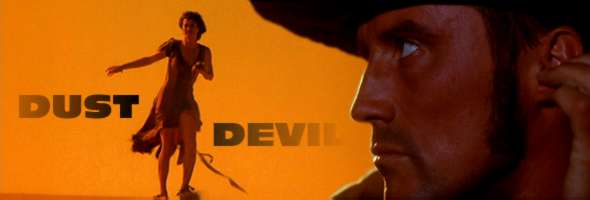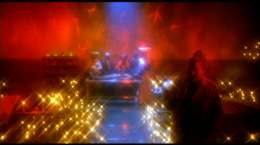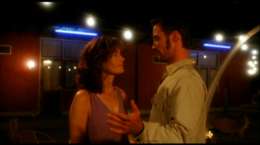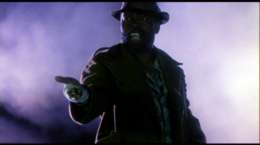

Color, 1992, 107m.
Directed by Richard Stanley
Starring Robert John Burke, Zakes Mokae, Chelsea Field, Rufus Swart
Subversive (US R1 NTSC) / WS (1.85:1) (16:9) / DD5.1
Following the distribution and censorship difficulties of his first feature film, Hardware, South African-born director Richard Stanley veered even further
 away from the commercial film market with his ambitious follow-up feature, Dust Devil, whose immediate fate quickly became a cautionary tale for filmmakers everywhere. Marketed as a horror film but really more of a dark head-trip along the lines of White of the Eye or Santa Sangre, it charts the odysseys of four different people in an isolated stretch of the South African desert where the stone-faced, trenchcoat-clad title character (played by Simple Men's Burke) carries out a creepy personal calling by picking up unhappily married women and decorating motel rooms with their blood. His next potential victim is Wendy (TV regular Field), whose recent separation from her husband, Mark (Swart), has him hot on her trail. Meanwhile tormented cop Ben (Mokae, cast against type as a basically good guy for once) tries to stop the mysterious killer from striking again, with Mark joining him on the hunt before it's too late.
away from the commercial film market with his ambitious follow-up feature, Dust Devil, whose immediate fate quickly became a cautionary tale for filmmakers everywhere. Marketed as a horror film but really more of a dark head-trip along the lines of White of the Eye or Santa Sangre, it charts the odysseys of four different people in an isolated stretch of the South African desert where the stone-faced, trenchcoat-clad title character (played by Simple Men's Burke) carries out a creepy personal calling by picking up unhappily married women and decorating motel rooms with their blood. His next potential victim is Wendy (TV regular Field), whose recent separation from her husband, Mark (Swart), has him hot on her trail. Meanwhile tormented cop Ben (Mokae, cast against type as a basically good guy for once) tries to stop the mysterious killer from striking again, with Mark joining him on the hunt before it's too late.
After the completion of filming and the rough assembly of a work print, Dust Devil was yanked from Stanley's hands by the European distributor and issued in a hastily-prepared edition that smoothed over most of its more challenging, mystical elements. To make matters worse, hatchet-happy Miramax jumbled the film up even worse for the 87-minute American release, which was redubbed, hacked into total incoherence, and shuffled off quickly to video. Eventually Stanley managed to regain rights to the original footage and assembled a "Final Cut" that appeared first on European television, then on a brief laserdisc release and a shabby-looking German DVD. Even in its most compromised incarnations, the film won over its fair share of fans thanks to Stanley's gift for striking imagery, hypnotic pacing, and unusual plot turns; though there isn't much bloodshed (apart from brief sequences near the beginning and end), the sense of mounting dread is skillfully built throughout with solid characterizations from all the performers. It's certainly not the most accessible film, though, particularly for a '90s audience getting its jollies from more digestible boogeymen like Hannibal Lechter. Also noteworthy here is the return of Hardware composer Simon Boswell, who contributes an excellent, atmospheric score with some themes he later developed even further in the somewhat thematically
 similar Lord of Illusions.
similar Lord of Illusions.
Fortunately fans can toss aside past video versions with Subversive's much-needed release, which presents the full final cut in a beautiful new transfer (from hi-def) with all of the blinding orange and red hues fully intact. No more smearing colors or muddy shadows here, folks. The detail in much of the darker scenes can finally be made out clearly, and the evocative photography benefits immensely throughout. The original surround soundtrack was always pretty solid and is included here, though home theater enthusiasts will get more mileage out of the 5.1 remix which boosts the rear channel activity even more and features some startling split-channel effects. You can't go wrong either way, though.
Most incredibly, this once-ignored film has been decked out with a five-disc edition. Yep, count 'em -- five discs. The main feature on disc one comes with a brisk audio commentary with Stanley and Subversive's Norman Hill, who cover all of the basics about the making of the film, Stanley's artistic intentions, the difficulties of desert shooting, and the post-production nightmares that plagued it for years. Clocking in a bit over half an hour, "Interview with Richard Stanley and Composer Simon Boswell" features both men talking separately and together about the making of the film, from its inception as a 16mm project through the completion of the final project with an emphasis on the technical aspects of assembling it into an audio-visual experience. The rough-looking but interesting "Dust Devil Home Movies" features a reel of behind-the-scenes footage
 with Stanley preparing for several sequences, with the cast relaxing and chatting about the film at regular intervals. A "16mm Scrapbook" covers the history of the lost 16mm demo version with a compilation of stills and drawings to highlight some of the differences from the final product, while a trailer for that same version gives a video demonstration of how it looked. Finally, another gallery features various ephemera from the film showcased by Stanley, and the disc is rounded out with talent bios, the feature's theatrical trailer, and promos for other Subversive titles including Defenceless, The Wild Blue Yonder, and Stanley's Voice of the Moon and White Darkness (more on those below).
with Stanley preparing for several sequences, with the cast relaxing and chatting about the film at regular intervals. A "16mm Scrapbook" covers the history of the lost 16mm demo version with a compilation of stills and drawings to highlight some of the differences from the final product, while a trailer for that same version gives a video demonstration of how it looked. Finally, another gallery features various ephemera from the film showcased by Stanley, and the disc is rounded out with talent bios, the feature's theatrical trailer, and promos for other Subversive titles including Defenceless, The Wild Blue Yonder, and Stanley's Voice of the Moon and White Darkness (more on those below).
Disc two features the extended, much-rumored workprint, which runs quite a bit longer (nearly two hours) and is assembled here by combining a non-anamorphic version of the transfer from disc one with inserted, time-coded video footage, so it's easy to tell where the excised material comes in. There's nothing tremendously earth-shattering added here, but the extra establishinig shots and bits of dialogue do add some nice atmosphere and should make for an interesting alternative for most viewers.
Anyone wondering what Stanley's been up to since Dust Devil (apart from his legendary involvement in the cursed Island of Dr. Moreau) will certainly find their answer here, starting with disc three, The Secret Glory. This 2001 documentary, proposed as a real-life Raiders of the Lost Ark, charts the obsession of Nazi Otto Rahn with discovering the Holy Grail, with his daughter and historical experts relating this too-bizarre-for-fiction tale in fascinating, linear detail. Stanley and Hill return for another fact-packed commentary covering the entire hour-and-a-half running time of this fascinating film. Boswell also contributes another excellent soundtrack (which can be isolated on a separate track), and Stanley also appears for another half-hour interview in which he talks about his own personal origins for embarking on this project.
Disc four packs in two more Stanley documentaries, both of which focus on real-life world issues from very different vantage points. Voice of the Moon (no relation to the Fellini film), a half-hour 1990 documentary, covers the daily lives in Afghanistan under Russian occupation. Its beautiful landscape photography easily betrays this as being from the same hand as Dust Devil, though the harrowing portrayal of a difficult, violent life makes the country's current role in world events even more immediate and alarming. Stanley appears for both a half-hour video interview ("Hangin' with the Taliban") and a commentary track in which he mostly focuses on the odd challenges posed by the filming, which was undertaken for personal reasons under financially-strained (and chemically-altered) circumstances. Once again Boswell's fine score can be played isolated, and the Stanley trailers are carried over with his bio. 2002's The White Darkness clocks in a bit longer (just under an hour) and covers the modern state of Voodo in Haiti, where everyday practices that may seem alien to American audiences are a mundane ritual similar to others carried out around the world. Again Stanley's own personal experiences with the religion come into play here, as he reveals on the final commentary track in which he contrasts Haiti's practices with those in South Africa and expounds on his own involvement in the ceremonies, much of which remained unfilmed to keep the trust of the residents. Again you get the isolated music track and more bios as well. The fifth disc in the set is Boswell's Dust Devil soundtrack, identical in content to the long-discontinued Varese Sarabande release (which was more widely distributed in America than the feature itself!). The hefty package comes with three thick inserts, including a new Dust Devil comic book by Phil Avelli which riffs on the mythology of the film with a not-surprising emphasis on sex and violence. The "Dust Devil Production Diary" is an often tormented account by Stanley written during and after filming, spread out over ten pages (in tiny type). He gives some insight into his inspirations for various scenes and talks about some of the more difficult financing and distribution hassles which would eventually prove to be the project's near-undoing. Finally, "The Documentaries of Richard Stanley" is essentially a long mission statement from the director explaining his departure from narrative film and his thoughts now on each of the projects. A rich and rewarding experience for both established cult film fans and newcomers, this is a startling and always fascinating release that will easily earn repeated visits over the years.